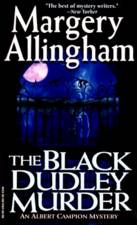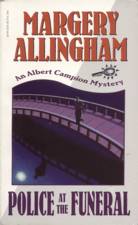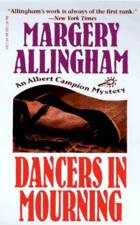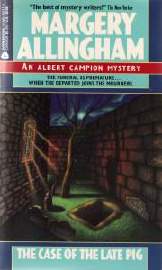

A Chronology of Albert Campion Stories
As I did with Dorothy Sayers' Lord Peter Wimsey stories, I'm going to assemble a chronology of Albert Campion stories as I read the series. The goal of this chronology is to provide a guide for the order in which the stories should be read, and therefore I've avoided giving spoilers in this chronology.Stories in italics are novels, while those in "quotes" are short stories.
| Year | Story | Comments |
|---|---|---|
| 1901 | Campion born? | In The Fear Sign, Campion is stated to be 31 years old. In The Case of the Late Pig, a schoolmate of Campion's is reported as having died at age 37. |
| 1929 | The Black Dudley Murder | Chapter XXVIII refers to "the Repository of the Bullion for the Repayment of the American Debt", which, combined with the absolute lack of references to Nazis in Germany (despite one of the principals coming from that nation) suggests that this novel couldn't take place much later than its publication date. |
| 1930 | Mystery Mile | The Black Dudley dagger turns up briefly in Chapter II in Campion's flat. |
| 1930 | Death of a Ghost | Chapter 2 states that the story occurs in a few months starting in March, 1930, and other parts of the book support this. |
| 1931 | Flowers for the Judge | Paul is murdered in January (c.f. Chapter 4), and the story occurs in the months following. |
| 1931 | The Gyrth Chalice Mystery | |
| 1932 | Police at the Funeral | |
| 1932 | The Fear Sign | |
| 1936 | Dancers in Mourning | Sutane's sister Eve is 17 in this story, and is stated to have been 1 in 1920. As the story occurs in the summer, the year seems certain. |
| 1937 | The Case of the Late Pig | |
| 1938 | The Fashion in Shrouds | Amanda states in Chapter 6 that it's been 6 years since she last visited Campion, in The Fear Sign.. Campion is stated in Chapter 7 to be a month away from turning 38. |
Some Background on Albert CampionWhen we meet him, Albert Campion is a private detective and friend of the police, operating out of a flat at 17A Bottle Street above the police station. Campion is oft-described as having a vacuous, inane expression behind his horn-rimmed spectacles, but he is in fact determined, highly intelligent, and widely skilled. His aide, Lugg, is a former burglar with a rough demeanor who keeps the Bottle Street flat."Albert Campion" is clearly an alias, and it's sometimes hinted that Campion's true identity lies not so very far from the British throne.
|
||
| Click on a book's image or title to order from Amazon.com |

The Black Dudley Murder
Carroll & Graf, PB, © 1929, 214 pp, ISBN #0-7867-0754-2Reviewed December 2002
What It's About: George Abbershaw, doctor and sometime consultant to Scotland Yard, is one of several invitees to a party at the dreary Black Dudley estate. Their host, Wyatt Petrie, is throwing it to entertain his uncle, Colonel Coombe, an invalid. During a peculiar party game involving the dagger associated with the house, Coombe is murdered, and his associated turn out to be criminals who hold the party hostage until they regain an item which has been lost. Abbershaw and fellow guest Albert Campion have several adventures in dealing with the criminals and trying to unravel the mystery of Coombe's murder.
What I Thought of It: Black Dudley is barely a Campion tale at all; Abbershaw is the protagonist, and the one who sees things through to their conclusion. Campion plays a prancing fool, but shows himself to be competent all the way through, if not exactly what you'd call charming. The story isn't much of a mystery and doesn't really play fair; it's written more as a suspense novel with a few witticisms, and often contrived dialogue. It's charming in that old-style British way, but is not really a good book.

Mystery Mile
Bantam, PB, © 1930, 249 pp, ISBN #0-553-29013-4Reviewed January 2003
What It's About: American Judge Crowdy Lobbett has been the near-victim of multiple murder attempts, and his son and daughter convince him to flee with them to England. It turns out he has a line on the mysterious head of the Simister gang. Albert Campion hooks up with them on the boat passage across the Atlantic, and Lobbett's son Marlowe enlists him to help. Campion brings the group down to Mystery Mile, a small village overseen by a couple of old friends of his. But the village isn't the haven they'd hoped for, when the Judge goes AWOL and the rest of the band finds themselves sorely beset by criminals.
What I Thought of It: Its title notwithstanding, Mystery Mile is again more of an adventure than a mystery. The identity of the head of Simister is the main mystery, but otherwise the story is a series of capers connected by smell clues leading to the next segment. There are some rousing moments, but it's the strength of the characters, not the plot, which make it worthwhile. Campion's character is fully rounded out, his nonsensical banter tripping effortlessly from the pages. Supporting characters Lugg and Thos are also quite amusing, a sort of Laurel-and-Hardy pair. The hints at Campion's true identity are more infuriating than enlightening, but I gather that's par for the course in the series.
Some editions contain a map of Mystery Mile. A frustratingly small scan of the map can be found here.

The Gyrth Chalice Mystery
Avon, PB, © 1931, 246 pp, ISBN #0-380-70572-9Reviewed March 2003
What It's About: The Gyrth family are the hereditary guardians of the treasured Gyrth Chalice, which Campion has learned has been targeted to be stolen by a ring of rich and untouchable criminal-collectors. The stakes are high: If the Gyrths lose the Chalice, then their lands and wealth (what little they have) revert to the crown. However, the criminal ring will only abandon the hunt if their agent dies in the line of work. Campion travels to the village of Sanctuary with the prodigal son Val, where he meets Lord Percival Gyrth, Val's sister Penny, and other denizens of the town. Then, Val's aunt Lady Diana turns up dead, apparently frightened to death in the middle of the night in a forest clearing, adding another wrinkle to Campion's task.
What I Thought of It: Allingham's novels get a bit more sophisticated with each outing, but still fall short of actual sleuthing, as there are precious few clues to what's going on, and events are revealed only through direct action rather through deduction. This isn't bad so much as it is disingenuous to call it a mystery novel. The book does continue the development of the main characters: Lugg has a more prominent role, and the tensions between himself and Campion add the story a new flavor (Lugg seems to be the only one able and allowed to get under Campion's skin).
Gyrth Chalice has some rousing moments of adventure (such as the confrontations with the villains), and also some disappointing revelations, which a tighter mystery would have built up to rather than just springing on us (who killed Lady Diana, for instance). The setting and mood are both well-done, though. Allingham seems to have the wry outlook towards the British countryside that Dorothy Sayers has, but without the critical eye that Sayers applies to her material and her predecessors in the genre. The series has yet to rise above the level of light reading.

Police at the Funeral
Carroll & Graf, PB, © 1932, 227 pp, ISBN #0-7867-0169-2Reviewed April 2003
What It's About: The family of the late Cambridge professor, John Faraday, is being murdered. His nephew by marriage, Andrew, is found floating in the river and shot through the head, and shortly thereafter his daughter Julia dies of apparently poisoning. Campion is brought in by the fiancee of an old friend of his, and he cooperates with Inspector Stanislaus Oates on the case. Faraday's window, Great-Aunt Caroline, is the formidable matriarch of the household and she retains Campion to investigate on her behalf. Her children William and Kitty are more eccentric than skilled. The house is considerably disturbed before the culprit is finally found.
What I Thought of It: Police definitely has more of a sleuthing feel to it than the earlier novels, which I appreciated. Seeing Campion confront someone who knows him without his alias (Great-Aunt Caroline) is also intriguing, although clearly Allingham is keeping Campion's identity a guarded secret. Allingham doesn't provide the clues terribly skillfully, however, and it's hard to see how the reader could have figured everything out from the pieces available. It's mainly enjoyable for its portrayal of the peculiar Faraday family, and the entertaining figures from the police force.

The Fear Sign
Avon, PB, © 1933, 231 pp, ISBN #0-380-70571-0Reviewed August 2003
What It's About: Campion is employed by the British government to find the legal keys to the claim of the little land of Averna, which supposedly belongs to the Earl of Pontisbright, but the Pontisbright line seemingly ended a hundred years earlier, and Averna has become important in the strife of the 1930s. To this end, Campion and his aides-de-camp (Guffy Randall, Jonathan Eager-Wright and Dicky Farquharson) head to the village of Pontisbright, competing with a dastardly group to find the items in question. There they meet the charming owners of the local mill - Mary, Amanda and Hal Fitton - who are the children of a man who once claimed to be the last of the Pontisbright line. Meanwhile, Lugg finds a dead body on the heath - which soon disappears, they meet the eccentric village doctor, and Campion must unravel an ancient riddle and struggle with the powerful man behind their competition.
What I Thought of It: Oddly named (the title inscription only turns up once), The Fear Sign is another adventure with only a veneer of mystery (everything gets solved through legwork, basically). The premise (a hitherto-unaccessible little country in Europe) must have seemed fanciful even in the 30s, but it's just a way of motivating our heroes to find the Mcguffin. Campion himself becomes a little more fanciful with each story, and has several fun lines here, while his interplay with the villains and with Amanda (wot, a little romantic attraction in Campion's life?) also keep one entertained. Allingham's plotting and character motivations often seem a little thin or befuddling (such as Campion's changes of heart during the final conflict), but still enjoyable.

Death of a Ghost
Carroll & Graf, PB, © 1934, 207 pp, ISBN #0-7867-0441-1Reviewed September 2003
What It's About: After his death, painter John Lafcadio instructed that 12 paintings of his were to be posthumously unveiled and sold, a charge his wife, Belle, and chosen dealer, Max Fustian, have faithfully carried out. In the eighth year of this plan, Campion attends the unveiling as a friend of Belle's. During an unexpected blackout, Lafcadio's one-time protege, Thomas Dacre, is murdered. Lafcadio's granddaughter, Lisa, is an immediate suspect, but Campion has his doubts. Other strange events, such as the disappearance of Dacre's other known work, lead Campion on a peculiar chase through the circle of Lafcadio's friends and hangers-on.
What I Thought of It: A peculiar mystery in that it moves from "whodunnit?" to "how do we prove the guilty party dunnit?" midway through, it's the cleverness and audacity of the crimes, and the character of the villain, which best characterize the book. Despite this, it feels a little weak, perhaps because Campion isn't his usual affable self but rather seems disspirited the whole way through. Perhaps because the book's ending feels too convenient. Perhaps because the setting isn't as exotic or the cast of characters provocative as, say, The Fear Sign. While continually enjoyable, this book seems to highlight the inconsistency of the series.

Flowers for the Judge
Bantam, PB, © 1936, 241 pp, ISBN #0-553-24190-7Reviewed March 2004
What It's About: Paul Brande, one of the family partners of the book publishers Barnabas and Company, is found dead in the company's safe one morning. His cousin Mike Wedgwood is put on trial for the murder, inasmuch as he had been in the safe the night before and Paul's body had been lying in the middle of the floor, and Mike had fallen in love with Paul's wife, Gina. As a friend of Mike's Campion comes in to investigate a seemingly open-and-shut case, uncovering secrets in the firm, and details of a 20-year-old disappearance of yet another cousin.
What I Thought of It: The best one yet, and a genuine mystery to boot! Two, in fact! Populated with quirky characters - some likeable, some not - and some interesting backstory. I suspected the outcome of the murder investigation a bit before Campion did, but the book's final secret was what made it rewarding. Campion's personality shines through as well, being comical at times, but thoughtful and serious when it counts. The biggest mystery of the novel is the title, which doesn't seem meaningfully related to the story, save for a trivial scene where the judge in the trial receives some flowers for the bench.

Death of a Ghost
Bantam, PB, © 1937, 262 pp, ISBN #0-553-23880-9Reviewed December 2003
What It's About: Campion's friend William Faraday (from Police at the Funeral) has written a rather fictional autobiography on which a successful musical has been based. But someone is harassing the star, dancer Jimmy Sutane, and Faraday asks Campion to come investigate. On a visit to Sutane's house, Campion meets and instantly falls in love with his wife Linda. Things take a turn for the worse when another visitor, Chloe Pye, turns up dead, seemingly accidentally run over by Sutane. As the situation escalates when the police are brought in, Campion suspects the worse and is reluctant to investigate too closely into the affairs of people he's come to care for.
What I Thought of It: The darkest Campion novel to this point, it's not quite the mystery of Flowers for the Judge, but it's not bad on that score, with plenty of suspects all around and some pretty nifty plot devices. Campion's attraction to Linda is a strange wrench thrown into the mix, one which I assume will be played out in later books, though I'm not sure how from where things stand at the end. The book moves forward with a sense of inevitability which Allingham often remarks on, and Campion is at such an emotional low that it's hard to say that it's a particularly fun story. Lugg's cheeky appearances are a very welcome respite from the dreary atmosphere. Overall it's one of the more skilfully crafted novels of the series, but has a very peculiar feel to it.

The Case of the Late Pig
Avon, PB, © 1937, 148 pp, ISBN #0-380-70577-XReviewed September 2004
What It's About: Campion receives an anonymous letter seemingly pertaining to the sudden death of his boyhood classmate R. I. "Pig" Peters - not a well-liked classmate - and he attends the funeral. Six months later an old friend summons him to the same part of the country where he again sees the dead body of Pig, this time killed by a falling urn in just the past day. Campion uncovers the secret of the two Pigs while those around him - and even himself and Lugg - risk the danger posed by the unknown murderer.
What I Thought of It: A rare Campion story in which Campion is himself the narrator - and it works really well! Pig is one of the best pure mysteries in the series, starting with the bodies of the two Pigs and the mysterious note, and developing from there. The mystery is of the "no one liked him so everyone had a motive" nature, and Pig certainly earned his bad reputation. The first person narration is advantageous in that it sidesteps further need to refer to Campion's "vacuous expression" and so forth, while portraying him as the capable-but-not-perfect investigator which he is, and more effectively conveying his real remorse at his failings. It's a very short novel and not an especially "important" one, but it sure is fun.

The Fashion in Shrouds
Carroll & Graf, PB, © 1938, 277 pp, ISBN #0-7867-0224-9Reviewed October 2004
What It's About: Campion's sister Val is a top fashion designer, including for the singer Georgia Wells. Campion has recently been investigating the disappearance of Georgia's one-time paramour, who turns up three years later dead of suicide. Georgia meanwhile is married the wealthy Roland Ramilles, and the two of them are both rather eccentric personalities. The situation gets tense when Georgia has a fling with Val's love, airplane maker Alan Dell, while Ramilles tries to make her jealous by dating a model from Val's agency. On top of that, Amanda Fitton (from The Fear Sign) is now an employee of Dell's, and to cover for spying on Georgia and Dell, she tells people that she and Campion are engaged to be married! But the drama turns tragic when one of the principals turns up murdered, and it's not clear how or why, much less by whom.
What I Thought of It: The weakest Campion novel so far. The story is muddled with not enough motivation and far too much exposition. The supporting cast are largely tedious boors, generally without strong story arcs of their own. Val is somewhat charming but mostly drops off the stage later in the book. Amanda is easily the most entertaining character - including Campion, who mostly broods and does most of his work behind-the-scenes. The mystery itself features too few clues and too much angst, and I found it very hard to follow. The final resolution has a short, lively adventure, although it's very reminiscent of the ending to The Case of the Late Pig. Very disappointing.
hits since 3 December 2002.